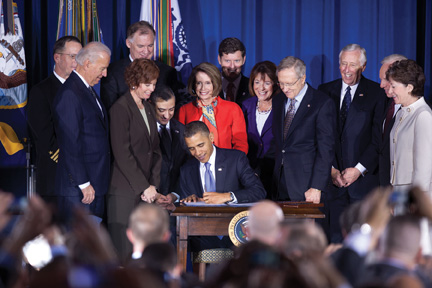Capping a 17-year effort, LGBT advocates heralded the Congressional repeal of the military’s discriminatory “Don’t Ask, Don’t Tell” (DADT) policy in December 2010—some even called it the greatest civil rights victory since the 14th Amendment.
The road to repeal was rocky to say the least, despite overwhelming public support of eliminating DADT. According to a December 2010 Washington Post-ABC News poll, 77 percent of Americans said gays and lesbians who publicly disclose their sexual orientation should be able to serve in the military.
At about the same time, the Pentagon published a comprehensive report on the effects of repeal, including the results of a survey of more than 500,000 military personnel. Overall, 70 percent of those surveyed thought that integrating gays into the military would be positive, mixed or of no consequence. However, 40 to 60 percent of personnel in the Marine Corps said that repealing the ban would be negative.
The San Francisco Chronicle predicted that repeal, after it occurred, would probably look a lot like the Y2K kerfuffle—a cultural brouhaha that turned out to be nothing.
The Senate voted on the issue December 18. Sen. John McCain (R-Ariz.), DADT’s biggest booster in Congress, made a desperate attempt to foil repeal, but the move backfired. Repeal passed with a 65-31 vote.
“It is time to close this chapter in our history,” President Obama said in a statement, relishing the completion of a controversial campaign promise. “It is time to recognize that sacrifice, valor and integrity are no more defined by sexual orientation than they are by race or gender, religion or creed.”
Before DADT can formally cease, Obama, Defense Secretary Robert Gates and the Chairman of the Joint Chiefs of Staff, Admiral Mike Mullen, must certify that the military is ready to give up the policy. Then, a 60-day waiting period must elapse before LGBT people can serve openly.
As if to confirm DADT’s questionable usefulness, a Washington Post audit of DADT enforcement, published in January, revealed that the military spent $193.3 million between 2004 and 2009 to dismiss and replace 3,660 LGBT servicemembers. Each discharge procedure cost a whopping $52,800, according to estimates offered by the Government Accountability Office (GAO).
Of those 3,660 discharges, about 34 percent were women. The Army led the pack with the highest percentage of dismissals (48 percent), followed by the Navy (25 percent), Air Force (15 percent) and Marine Corps (12 percent). Curiously, the branch with the lowest percentage of discharges also evinced the most reluctance to support repeal.
“[The] GAO report underscores that the ‘Don’t Ask, Don’t Tell’ law not only deprives the military of the qualified Americans it needs, but has also been a huge waste of taxpayer dollars on replacing patriots lost under this discriminatory law,” said Aubrey Sarvis, Army veteran and executive director of Servicemembers Legal Defense Network, the national legal services and policy organization for LGBT military personnel.
In late January, the Pentagon released its plan to begin implementing equality in the armed services. As reported in the Washington Post, Defense Secretary Robert Gates instructed military staff to roll out the reforms cautiously but “expeditiously” and called DADT repeal a “milestone” event.
Implementation involves sensitivity training for all ranks using lectures and presentations. Servicemembers will be encouraged to treat all comrades with respect, and that no policy going forward would be established “solely on the basis of sexual orientation,” the Post reported. Harassment or discrimination would be outlawed.
Chaplains and civilian staff would be trained first, followed by officers and enlisted troops. The Pentagon did not specify the timeline for training of all 2.5 million personnel, but presumably, Obama, Gates and Mullen can certify DADT’s end before all training is complete.
Because of the Defense of Marriage Act, the military is prohibited from recognizing same-sex marriages or civil unions, so a few adjustments to the current benefits and personnel policies will be required. The Post reported that the Pentagon will explore whether LGBT servicemembers could eventually designate their partners as beneficiaries.
Perhaps the most frustrating news for the thousands of personnel discharged under DADT: they’ll be able to reenlist, but not be eligible for lost pay. Pending DADT-related investigations will cease. Servicemembers who refuse to serve with openly gay colleagues can obtain voluntary discharges.
SLDN head Aubrey Sarvis applauded the Pentagon’s plan but pressed for speed. “All of the troops, from top to bottom, do not need to undergo a comprehensive training an educational program before there is certification. The training and education plan need only be in place,” he said. “In addition, much of the training can continue to take place during the 60-day period following certification.”
As we were going to press, however, Rep. Duncan D. Hunter (R-Calif.) introduced legislation in the House that would slow down the repeal process and require that all four military service chiefs certify that the repeal of “Don’t Ask, Don’t Tell” won’t negatively affect their combat units.
We may not know the true impact of repeal for years to come. But one thing’s for certain: it’s a step in the right direction.


What Do You Think?